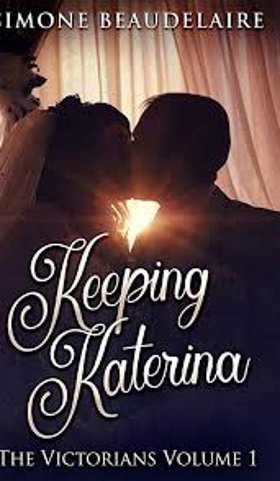“Yes, I am ready,” Aimée replied in French-accented Italian. Curtsying to the
crowd, she seated herself at the harpsichord and announced, “I would like to begin with ‘Greensleeves’”
She played a few simple chords on the keyboard, setting the key, and then took a deep quiet breath and began to sing.
Instantly, Katerina knew she was in deep trouble. A true professional,
Aimée's voice was flexible, rich and captivating even though she didn't play the
harpsichord particularly well. Her accompaniment consisted of a series of simple
chords to help her keep in tune. Her English pronunciation was also rather bad,
but it made no difference. The maturity of her tone would turn this competition
into one between a pipe organ and a piccolo. Then, to increase the difficulty, she
stopped playing and sang a capella during the middle verse. When she played again on the third verse, she was still perfectly in tune. The guests murmured in
appreciation of the trick. She ended plaintively, “who but my lady,
Greensleeves?”'
The audience applauded. She rose and flounced to her seat. The opening
gauntlet had been well tossed. It is not a performance I want to follow, Katerina admitted to herself as she shuffled, her knees weak, to the harpsichord bench.
Swallowing hard, she looked at the instrument for a long moment, pleading silently with it to help her.
“‘Scarborough Fair,’” she said at last. Then she placed her fingers on the
keys and began a complicated run of notes. She had never been so aware of the people staring at her back. She felt vulnerable, exposed, and she glanced up.
Warm gray eyes met hers encouragingly. Christopher. Christopher will
support me. Soothed by his sweet look, she turned her attention inward and began to sing. “‘Are you going to Scarborough Fair/ Parsley, sage, rosemary and
thyme/ Remember me to one who lives there. /She once was a true love of mine.’”
She sang the nonsensical lyrics lightly. She couldn't match Aimée for depth
and richness, so she didn't try. Instead, she focused on the feather lightness of her nineteen-year-old voice, singing sweetly and prettily, accompanied by flashy notes on the harpsichord. It's the best I can manage. I pray it's enough for a pleasing performance.
As the end of the song neared, she had a flash of insight about its message.
True love can overcome insurmountable odds, perform impossible tasks. Haven't
Christopher and I done that? We have. We've done the impossible. It meanssomething.
Understanding dawned at the end of the last verse.
It means I love him. Truly love him. At the staggering realization, her voice faltered and grew husky. She played a fancy interlude to cover the mistake, and
when she began to sing again, it was for her husband's ears alone.
“‘When at last he has finished his work/ Parsley, sage, rosemary, and thyme/
He'll come to claim his cambric shirt/ And ever be a true love of mine.’”
She finished with a flourish of fingers and took a deep breath, only to jump
in alarm as applause thundered around her. Feeling unsteady, Katerina remained
seated at the harpsichord.
Aimée moved to the pianoforte and began immediately. Not surprisingly, the
other woman's second was in French, another folk song, called “Jeune Fillette.”
This teasingly flirtatious number described falling in love in the springtime, with
pointed references to fickle lovers, male and female.
It was a clear invitation, and she gave Christopher a pointed look as she tripped lightly over the coloratura notes, demonstrating that a mature voice did
not need to be heavy or slow. She could beat Katerina at her own game—and in
her own marriage—her blatant glare seemed to claim.

























